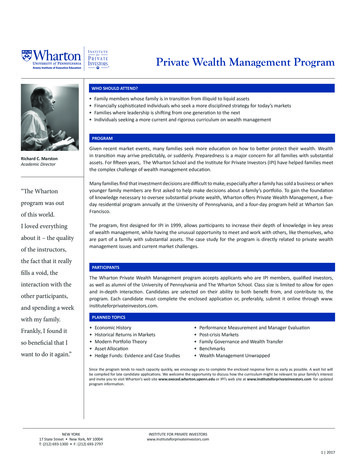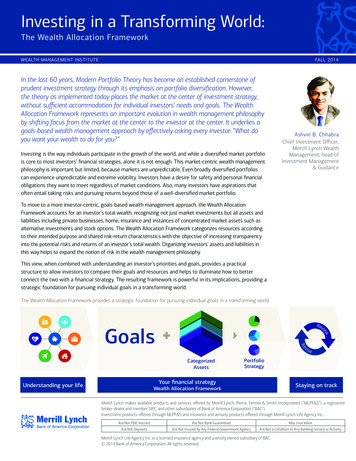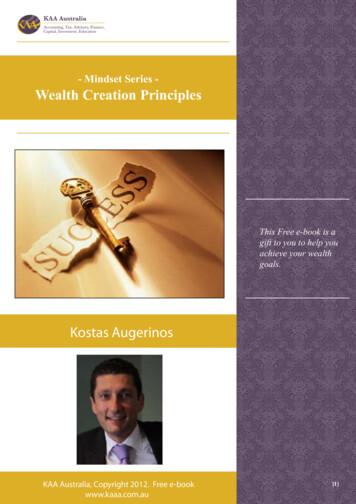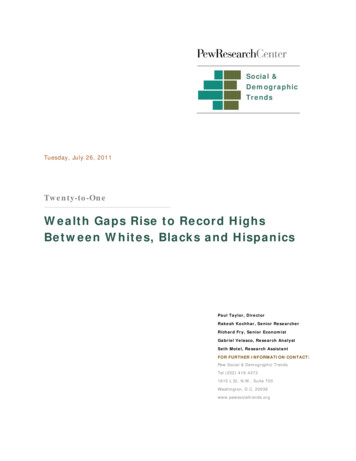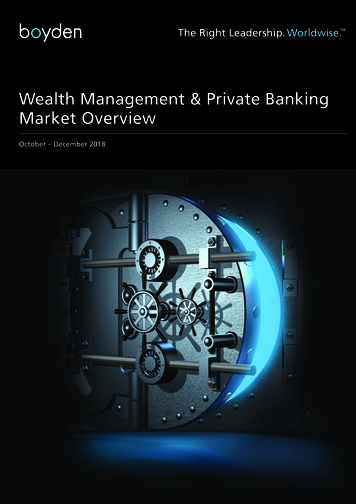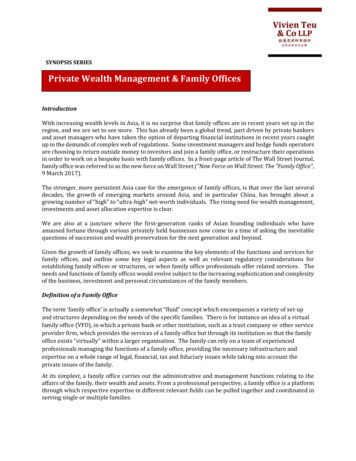
Transcription
SYNOPSIS SERIESPrivate Wealth Management & Family OfficesIntroductionWith increasing wealth levels in Asia, it is no surprise that family offices are in recent years set up in theregion, and we are set to see more. This has already been a global trend, part driven by private bankersand asset managers who have taken the option of departing financial institutions in recent years caughtup in the demands of complex web of regulations. Some investment managers and hedge funds operatorsare choosing to return outside money to investors and join a family office, or restructure their operationsin order to work on a bespoke basis with family offices. In a front-page article of The Wall Street Journal,family office was referred to as the new force on Wall Street (“New Force on Wall Street: The ”Family Office”,9 March 2017).The stronger, more persistent Asia case for the emergence of family offices, is that over the last severaldecades, the growth of emerging markets around Asia, and in particular China, has brought about agrowing number of “high” to “ultra-high” net-worth individuals. The rising need for wealth management,investments and asset allocation expertise is clear.We are also at a juncture where the first-generation ranks of Asian founding individuals who haveamassed fortune through various privately held businesses now come to a time of asking the inevitablequestions of succession and wealth preservation for the next generation and beyond.Given the growth of family offices, we seek to examine the key elements of the functions and services forfamily offices, and outline some key legal aspects as well as relevant regulatory considerations forestablishing family offices or structures, or when family office professionals offer related services. Theneeds and functions of family offices would evolve subject to the increasing sophistication and complexityof the business, investment and personal circumstances of the family members.Definition of a Family OfficeThe term ‘family office’ is actually a somewhat “fluid” concept which encompasses a variety of set-upand structures depending on the needs of the specific families. There is for instance an idea of a virtualfamily office (VFO), in which a private bank or other institution, such as a trust company or other serviceprovider firm, which provides the services of a family office but through its institution so that the familyoffice exists “virtually” within a larger organisation. The family can rely on a team of experiencedprofessionals managing the functions of a family office, providing the necessary infrastructure andexpertise on a whole range of legal, financial, tax and fiduciary issues while taking into account theprivate issues of the family.At its simplest, a family office carries out the administrative and management functions relating to theaffairs of the family, their wealth and assets. From a professional perspective, a family office is a platformthrough which respective expertise in different relevant fields can be pulled together and coordinated inserving single or multiple families.
Broadly, family offices can be categorized as either ‘single’ or ‘multi’, where a “singlefamily office” would serve one ultra-affluent family, while a multi-family office would more resembletraditional private wealth managers, whose business is established to serve several affluent families atonce.Besides, the functions performed by a family office may cover two distinct levels of management, althoughthe two levels are often overlapping. The first level can be defined as relating to the family’s coremanagement and overall interests in the family businesses and assets, which may be referred to as the“ownership/trust level”. The family office can be structured at this level driven by considerations aroundtax and succession planning as well as governance for the overall management and organization of thefamily’s ownerships and assets. On the other hand, the second level may be considered the “operationallevel”, being the administrative and operational aspects of the family assets, such as the day-to-dayadministration of the ownership and management of the family businesses or family trusts, and serviceson the investment management and asset allocation of the family’s wealth, which may or may not be heldthrough family trusts.Overview of Family Office FunctionsOwnership/Trust LevelFamilyOwnership &Governance-Family CharterFamily GovernanceFamily TrustsProtector/EnforcerLetter of wishesFamily InterestsOperational LevelBusiness PlatformHeld under Special Purpose Vehicles(SPV):Operating companiesLocal business enterprisesHolding companies for real estateand other assets.SPVSPVSPV123Investment PlatformVarious non-business relatedinvestments held throughinvestment structures orarrangementsFamily Office--2EmployeesDesignated serviceproviders(accountant, investmentadvisor, lawyers, etc )Day-to-dayadministration
Accordingly, the activities and offering of services or expertise within family officesor their service providers are structured around the needs of these functions over the two levels. Familyoffices would seek to establish internal resources or engage external service providers to advise or assiston the key aspects of these functions, such as the following:Family Charter & Governance Families may wish to establish family charter or principles of governance in order to reflect and instillthe core values and legacy which shall drive the strategic direction and vision of the family businesses.Family offices could have an important role in developing a framework for family members andstakeholders to be properly engaged in determining and operating the family businesses and affairsin accordance with the family charter or governance principles. Family office professionals andadvisers may provide appropriate recommendations and assist in putting in place necessary boardsof management and governance structures that shall oversee the implementation of the family charter,and which could also involve the next generation family members in picking up the key principles andskills for continuing the family legacy. Within considerations of family legacy, family offices may often also engage in management andadministration of the family charitable and philanthropic efforts. While the approach and extent maydiffer, certain recent market statistics suggest that increasingly high-net-worth and ultra-high networth families are tending to establish formal principles and structures based upon or through whichthe family wealth is applied to selected good causes. This calls for administrative staff or professionalservice providers who are experienced in working with charities or philanthropy projects.Tax, Succession Planning & Trusts As families grow in complexity both in family businesses and an extended family network of members,often across multiple jurisdictions, managing the ownership interests of family members can becomecomplicated and cumbersome. Often, tax implications demand detailed administrative support andthoughtful tax planning, which require dedicated support by experienced family office professionals. Besides, careful planning is necessary to address questions and needs around inter-generationaltransfer of wealth, especially as families hope to strike a balance between having minimal disruptionto the running of family businesses, preservation and investment of family assets, while providing forevolving situations and needs of future generations. Succession planning necessarily involves issues around transfer of ownership and controls. Thepotential tax incidents relating to transfers of ownership (such as gifts tax, inheritance tax, estateduties, stamp duties, for example or the likes, and also income tax or capital gains tax on holding ordisposal) need to be considered. These can get quite complicated especially when family members,nature and location of assets in various jurisdictions attract myriad possible implications. Therefore, family offices are often involved in considering the detailed issues in succession planningrelevant to the specific families. Where appropriate, as quite commonly used, trust structures are putin place for succession planning and transfer of wealth over time. The separation of legal andbeneficial interests within a trust structure allows for a greater degree of flexibility as to how assetscan be applied for the use and benefit of different family members across generations, and also as to3
eventual transfers to specific beneficiaries. By using adiscretionary trust structure, for example, beneficiaries caneither be granted “fixed” interests in the trust assets or,alternatively, the trustee may be granted discretionary powerof determining distribution of income and/or capital and towhich beneficiaries or any relevant conditions. Others mayconsider structures such as foundations as well as certaincorporate or non-corporate vehicles that may be includedoverall depending on the specific circumstances andrequirements of the family and its objectives. However, a distinction should be drawn between familyoffices that are themselves the subject matter or operator ofa trust set-up, and those who are actually providers of trustservices.Professional service providers engaged in theprovision of trust services and in particular acting as trusteesare often regarded in law as fiduciaries and may be subject tocertain specific licensing or regulatory requirements. On theother hand, family offices may use or operate private truststructures, but would need to consider specific issues withrespect to the control and operation of such structures byfamily members.When establishing a trust structure, it iscommon for the patriarch / matriarch toinvariably feel uncertain about having tosurrender control or ownership interestover the subject assets. Some instrumentsfor safeguards are available to give a levelof comfort that his/her wishes will beconsidered and observed in the long-term.A number of jurisdictions offer truststructures which can be adopted forfamilies. For example, customized trustregimes in the British Virgin Islands andCayman Islands, namely the Virgin IslandsSpecial Trust Act (VISTA) and the SpecialTrusts (Alternative Regime) Law (STAR),respectively, are designed to achievefamily purposes of holding interests inunderlying family businesses and assets.Asset Allocation & Diversification Whether ownership remains directly with family members or becomes indirectly owned by the familythrough a trust structure, family offices are often engaged in certain asset management and allocationactivities for investment of the family wealth and assets. The extent of set-up and breadth of expertisemay vary depending on the investment appetite of the particular family. Principles of investmentdiversification typically see family offices of reasonable sophistication applying family wealthtowards a range of different investment strategies and asset classes. Accordingly, family offices areoften staffed with investment professionals with relevant expertise who assists or assumesinvestment management and decisions, and who may sometime be family members. Single family offices which are involved in investment management and asset allocation for thefamily’s own assets are again distinct from multi-family offices providing such services for a numberof families. Multi-family offices are in effect investment managers or investment advisers who areusually subject to financial regulatory requirements. Operators of family offices should take intoaccount any relevant regulatory requirements on providing investment services beyond a certainnumber or closed-group of investors. There may be certain registration or licensing requirementsunless relevant exemptions apply. From a family perspective, investing through a family office may allow the family to maintain controlover asset allocation decisions in line with core family principles or legacy. Family offices typicallyengage in some angel or venture capital investments in their chosen sectors, and are nowadaystending to consider environmental, social and governance factors in investments. Family offices mayalso seek to provide the younger generation an opportunity to gain direct experience by beinginvolved with certain aspects of running certain investments or projects.4
Family offices may also consider structuring investments based on their ownunique requirements and circumstances. A family office may choose to establish a dedicatedinvestment fund structure for the family instead of having family assets pooled with other investors,while also retaining some control over the investment decisions. An external investment manager oradviser may be brought in if desired. Besides securities and financial assets, high-net-worth and ultra-high-net-worth families would oftenalso invest in other asset classes such as art, antiques, precious metals, jewelry and gemstones, inrespect of which the legal and practical matters around selection, valuation, authentication,ownership, safe custody, insurance, transfer, succession and other issues of management similarlyrequire some dedicated attention and engagement of expertise through the family office.The choice of location for establishing a family office would need to be taken considering the nature andrange of activities to be carried out at the family office, the location and proximity of relevant familymembers, and the availability and depth of sufficient resource and well-qualified professionals to meetthe required services and functions of the family office.This is distinct from, and will need to becompared and considered together with, however, the choice of jurisdiction for the family trust, or otherkey entities or vehicles through which wealth of the family is held or invested. Therefore, it is quite typicalthat a family office tends to be located in a well-established financial centre, whereas the family trusts andthe structures through which investments or assets are held or operated are usually established anddomiciled in offshore and/or tax efficient jurisdictions.Structuring a trustA number of jurisdictions offer trust structures whichcan be adopted for families. Professional trustcompanies have long been established in jurisdictionswith a common law legal framework, to provideprofessional trustee services to family trusts of thevery wealthy.Depending on where the wealthy families and theirassets are based, there are offshore jurisdictions allaround the world which are well suited and carry adepth of expertise setting up and maintaining a trust.While many other jurisdictions continue to provide therelevant legislation for trust law, historically the mostfrequently chosen offshore jurisdictions for setting upa trust would either be the BVI, Cayman Islands orJersey. Saying this, families should neverthelessconsider the following issues when deciding on theappropriate governing law: Examples of various trust jurisdictions:GuernseyIsle of ManJerseyLuxembourgLabuanSingaporeHong KongBermudaBVICayman IslandsCook IslandsNew ZealandTime-Zone: Depending on where the relevant parties are located, the proximity of the offshorejurisdiction can drastically lower the turnaround time for communication, allowing for a moreresponsive management of the trust.5
Legal History: As the trust structure will ultimately hold legal ownership of theassets being held, families may (understandably) require a level of comfort in the legal systemgoverning the said trust. Based on the relevant legislation, jurisdictions with longer history in dealingwith trust law tend to provide a more comprehensive and sound administrative protection. Court System: Similar to the legal history mentioned above, a jurisdiction’s court system could alsobe a relevant factor to consider where to set up a trust. Should the need arise for a party to rely onthe local courts to enforce any responsibilities, it would be prudent to consider a court system whichhas experience in dealing with such matters. Variety of Trust Structures: Different families may set up trusts for different reasons. It is thereforeimportant for families to consider the structural and legal difference of trusts not only provided bydifferent jurisdictions, but also the different trust structures available within the same jurisdiction.Certain jurisdictions have developed customized trust regimes. These trust regimes allow establishmentof purpose trusts which can depart from traditional common law trust principles. Unlike traditionalcommon law trust structures where the trustee has a fiduciary duty to oversee application andmanagement of the trust assets, under such trust structures, the trustee’s duty is to see to the purpose ofthe trust which is to hold certain assets. Where the asset is a company, the management of the saidcompany can be left to the appointed director(s) of the company. The ownership is segregated frommanagement of the company, and is able to provide the settlor with a certain level of control over thebusiness during his/her lifetime.Private Trust CompaniesAside from the trust structures mentioned above, another practice is using a private trust company(“PTC”), which has the sole purpose of acting as a corporate trustee for a trust. A PTC is essentially aprivate company with limited liability, usually incorporated in an offshore jurisdiction, and permittedunder its constitutive document to act as a trustee for one or more trust structure. What differentiates aPTC from professional trust companies is its ownership and that it is often specifically dedicated to aparticular family or trust. A PTC may be adopted together with a VISTA or STAR trust.1Whereas a professional trustee offers specific expertise of a fiduciary, longevity and independence of aninstitution, the following are the real and/or perceived advantages of adopting a PTC: Privacy: Adopting a PTC allows the Settlor to maintain a level of confidentiality and privacy withregard to the assets and business activities, rather than appointing a large and highly regulatedinstitution as a bank trustee.1Unlike a ‘vanilla’ trust (where the trustee may be subject to legal requirement to consider from time to time whether itis in the best interest of the beneficiaries that some of the investments be disposed of (and whether some or all of thedirectors of the underlying companies should be replaced)), when using VISTA trusts, shares in the underlying BVIcompany may be continually held, without the need for the trustee to consider whether or not to dispose of them.Directors may be removed only under specified conditions that could be tailor made under the trust’s own “change ofdirector rules”. STAR trusts achieve the same objective via the careful drafting of the trust’s purpose.6
Reassurance of Assets: Transfer of legal title occurs when appointing a PTC,however the board of directors of the PTC may be constituted with the Settlor’s trusted adviser(s) oreven family members, which would provide a level of comfort over management and control. Flexibility of Assets: Some financial institutions may have certain reservations or particularrequirements with respect to holding non-conventional assets such as operating companies, majorityshares of a publicly traded company, landed property (both within and outside Hong Kong) andprecious artworks, in which case it may be more appropriate or necessary for a PTC to be establishedas trustee. Efficient and Effective Decision Making: Should an active business be among the assets controlledby the trust, there may be a need for a faster decision making process. Unlike professional trustcompanies which would most likely have no experience in running the business, the board of directorsof a PTC would usually be made up of advisors and/or family members familiar with the business, thiswould allow for a speedy response to business decisions. Cost: Setting up a PTC may be quicker and at a much lower cost than setting up a trust company witha restricted trust license. Fiduciary Duties: A trustee is subject to fiduciary duties regardless of whether the trustee is anoutside trust company or a PTC. If a PTC is used, usually held by a purpose trust created for the solepurpose of owning shares in the PTC, thus, the PTC is an “orphan entity” and shares in the PTC willnot be subject to probate and estate duty issues. Consideration should also be given as to who shouldbe the directors of the PTC. If the settlor is a director, there is potential risk he may be deemed not tohave sufficiently divested the trust assets and those assets are at risk of being deemed part of hisestate in determining the estate duty payable. Additionally, a director of the PTC owes a fiduciary dutyto the PTC.Investment Management & StructuresOne feature commonly incorporated within a family office is the function of a bespoke asset managerspecifically to serve the investment needs of the family. In this instance, investment professionals orportfolio managers may be engaged by the family to run private fund(s) or investment portfolios.Through this platform, a range of investment strategies may be managed to fit the needs of the family’soverall investment objectives.In Hong Kong, multi-family offices may be required to hold a license from the Hong Kong Securities &Futures Commission (“SFC”) to engage in relevant regulated activities, possibly type 4 – advising onsecurities, type 5 – advising on futures contracts (if relevant) and/or type 9 – asset management. It isalso not unusual for a set-up that first started as a single-family office to subsequently develop into a multifamily office, as the original team grows in expertise and track record then sees the value and opportunityof providing investment services to other high net worth families. Family offices should be aware of therelated regulatory implications and when a need for license may be triggered.Family offices may establish or invest through dedicated fund structures specifically set-up depending onthe types of target assets. For multi-family offices, more often than not, private fund structures are usefulfor pooling assets of different families, enabling sharing of costs and risk diversification.7
The following are some examples of possible structures bothsingle and multi-family offices can consider, and theappropriate fund vehicle or structure may be established in ajurisdiction or domicile of choice suited to the family, subjectto relevant tax considerations: Unit trusts: As a common fund structure, a unit trustallows investment assets to be held by a trustee for andon behalf of holders of units who shall be interested in theinvestment returns of the underlying assets, as each unitrepresents a share in the underlying assets. Theunitization of interest may facilitate ease of administeringownership and transfers, as well as exits anddistributions, subject to realization or liquidity of thecapital and income from the underlying assets.Under new legislation introduced on theHong Kong open-end fund company (OFC)structure, it would also be possible toestablish sub-funds where the assets andliabilities of one sub-fund will be ringfenced from those of other sub-funds.The availability of the OFC structure ispending detailed implementing rules to beissued by the Hong Kong SFC. As the OFCwill be subject to the SFC regulatoryoversight and is required to appoint a SFClicensed investment manager as well as acustodian who meets SFC’s requiredeligibility, the use of the OFC for privateclients and high-net-worth families may bemore likely adopted by multi-family officesrather than single family offices, if familyoffices wish to consider this new HongKong vehicle. Segregated Portfolio Company (SPC) or Protected CellCompany (PCC): This is an alternative structure whichsingle and multi-family offices may tend to adopt. Forsingle family offices, an SPC or PCC can segregate assetsas well as liabilities into separate independent portfoliosor “cells” which could be differentiated by asset classes,distinct geographic focus, different ownerships or otherreasons to separate one from the others. For larger single family offices with liquid assets, there maybe a wish to appoint different investment managers to manage different cells for diversificationpurposes. Apart from the ease of adding segregated portfolios or cells to raise cash and invest indifferent time periods, an SPC or PCC may be a more cost effective approach than setting up multiplefund structures to achieve different investment strategies. Establishment costs and operating costsare lower, as these are spread and administration are shared across different segregated portfolios orcells. Limited partnership: Usually established as a closed ended structure, family offices may choose thisstructure to hold investments in private equity and real estate investments, or other illiquid assets tobe held over a certain term. A limited partnership structure may be particularly appropriate forpooling together investments by a number of families. A lead family office or the multi-family officefamily may own shares in the General Partner that manages and exercises overall control of thestructure.In considering the choice of structures as well as jurisdictions for establishment, appropriate legal as wellas tax advice should be taken. Depending on the intended purposes, certain families may also considerestablishing charitable entities or foundations through which the family wealth may be invested andapplied. Family offices should familiarize themselves with the broad range of structures that may beadopted and possible jurisdictions, in order to suit the investment needs, management and operationalarrangements, legal and tax considerations for the families and the assets in question.8
Foundations: an alternative structureFoundations have been broadly accepted within civil lawjurisdictions, and appear to be adopted by a growingnumber of common-law jurisdictions as well. Similar toother legal entities, foundations are structures throughwhich legal ownership of property or assets are heldand/or transferred.Possessing the key legal attributes of corporations, whileat the same time operating through a purpose or benefitsimilar to a trust, foundations can be a platform forcharitable activities, but also for asset management andtax planning purposes.Hong Kong trustee servicesComparing features of foundations with other legal entities:Fundamental FeaturesShareholder’s InterestCorporations Trusts Foundations Beneficiary’s Interest Separate Legal Entity Operating for a definedPurpose or Benefit Perhaps in recognition of the increasing demand for trust services, Hong Kong trust law was recentlymodernized to strengthen the attractiveness of Hong Kong trust services industry among a competitiveinternational market. The Trust Law (Amendment) Ordinance 2013 was brought into effect on 1December 2013, with changes to the Hong Kong Trustee Ordinance (Cap.29) (the “Trustee Ordinance”)with respect to the powers, duties, responsibilities and remuneration of trustees. While this has madethe Hong Kong trust law regime more updated and into closer alignment with other jurisdictions, trusteesshould still be aware of differences from other jurisdictions and the legal implications, especially whileoperating internationally.Professional trust companies seeking to operate and provide trust services in Hong Kong should alsoconsider the requirements for establishing a trust company under Part 8 of the Trustee Ordinance. Savefor private companies2, any company incorporated in Hong Kong can apply in writing to the Hong KongCompanies Registrar to be registered as a trust company, subject to the following requirements:1. the objects of the company in its articles of association are restricted to some or all of the objects setout in Section 81 of the Trustee Ordinance;2. the issued share capital of the company is not less than HK 3,000,000;3. HK 3,000,000 (or at least that amount) of the issued share capital is bona fide fully paid up for a cashconsideration;4. the board of directors has been duly appointed;5. the company has complied with the deposit requirements under the Trustee Ordinance (for a sum notless than HK 1,500,000);6. the company is able to meet its obligations, apart from its liability to its shareholders, without takinginto account the sum deposited with the DAS mentioned in point 5 above.Section 81(1)(d) of the Trustee Ordinance sets out a prescribed list of objects for trust companies, whichcannot be exceeded. Among the permitted objects, a trust company can:2As defined under Section 11 of the Companies Ordinance (Cap. 622), a company is a private company if(a) its article:(i) restricts a members’ rights to transfer shares;(ii) limit the number of members to 50; and(ii) prohibit any invitation to the public to subscribe for any shares or debentures of the company; and(b) it is not a company limited by guarantee.9
“act as investing and financial agent for and on behalf of executors, administrators, and trustees or anyother persons whatsoever and to receive money in trust for investment and to allow interest thereonuntil invested . ”While any company carrying on a business in the regulated activities of investment management oradvising in securities is subject to be licensed by the SFC, trust companies registered under the TrusteeOrdinance engaged in such activities “wholly incidental to the discharge of its duty as such (i.e. as trustee)”fall within an exemption from licensing requirement. The exemption would cease to apply if the portfoliomanagement service provided becomes a separate or distinct business of the trust company, although atrustee company may typically appoint an appropriate investment professional to manage the portfolioor, in practice, acts on professional advice in carrying out its duties as trustee.Besides
are choosing to return outside money to investors and join a family office, or restructure their operations in order to work on a bespoke basis with family offices. In a front-page article of The Wall Street Journal, family office was referred to as the new force on Wall Street ("New Force on Wall Street: The "Family Office", 9 March 2017).




